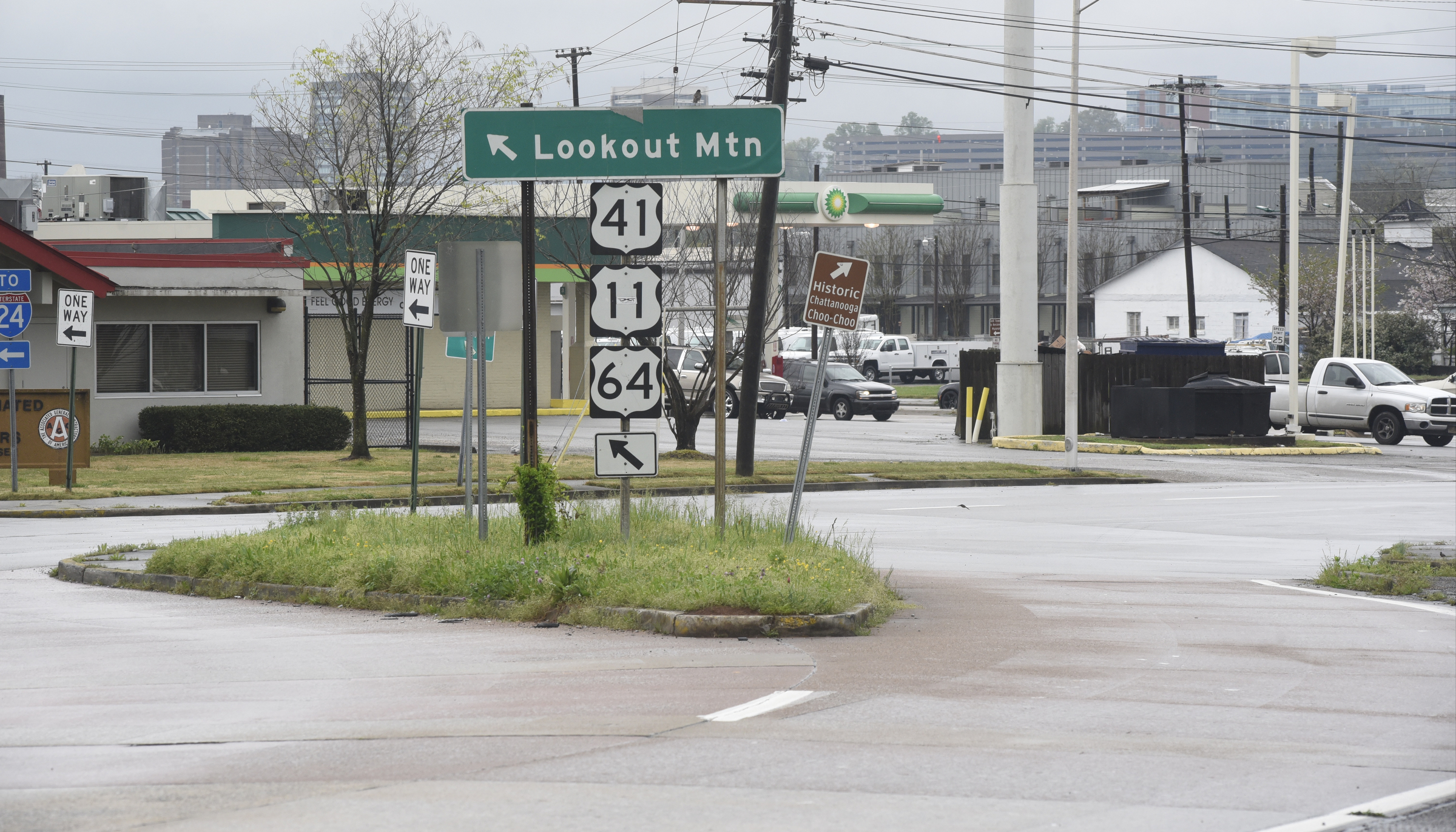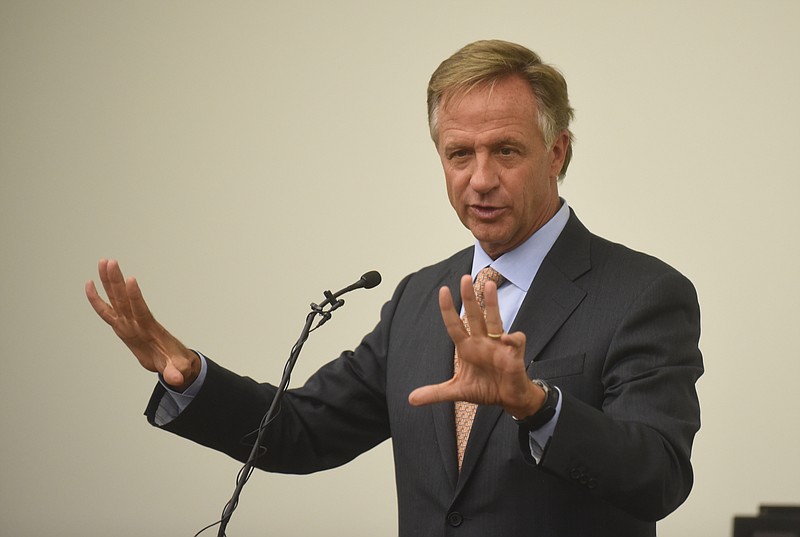 Staff photo by John Rawlston / Motorists taking the Lookout Mountain exit can be confused by this intersection and its signage, seen Thursday, Mar. 31, 2016, in Chattanooga. Tennessee Gov. Bill Haslam has announced a plan for road construction in Tennessee that will be funded in the next three years, and it includes modification of the I-24 interchange at Market and Broad Streets.
Staff photo by John Rawlston / Motorists taking the Lookout Mountain exit can be confused by this intersection and its signage, seen Thursday, Mar. 31, 2016, in Chattanooga. Tennessee Gov. Bill Haslam has announced a plan for road construction in Tennessee that will be funded in the next three years, and it includes modification of the I-24 interchange at Market and Broad Streets.NASHVILLE - Gov. Bill Haslam's new 3-year plan for state roads and highway sets in motion an estimated $46 million project aimed at transforming a confusing Interstate 24 interchange where motorists exit to go to Chattanooga's Southside and Lookout Mountain.
State Transportation Department officials plan to begin acquiring property next spring for a wider eastbound exit lane, a new ramp into the Southside and a simpler connector road to South Broad, Market and Williams streets.
The I-24 interchange near downtown is among five Chattanooga projects in a statewide plan, released Thursday by Haslam and Transportation Commissioner John Schroer, which would provide $2 billion in infrastructure investments on 79 individual project phases in 42 counties as well as 15 statewide programs.
Other local projects over the next three years include purchasing property and widening sections of Bonny Oaks Drive in Chattanooga and Apison Pike in Collegedale.
Funding for projects in the next fiscal year will be included in the governor's proposed annual spending plan for Fiscal Year 2016-2017, which has to be approved by the General Assembly.
Future phases of projects would require additional approval in in FY 18 and FY 19, administration officials said.
Haslam released the plan, which is updated annually, even as his call for increased taxes to deal with current and future transportation needs remains stalled amid state lawmakers' election-year concerns.
The administration says it has a $6.1 billion backlog of previously approved projects that will take years to complete, let alone another $6 billion or so of "wish list" projects it can't get to because current funding levels don't allow it.
Officials say this year's three-year program continues the state's focus on having a "high quality" state transportation network that is "safe and reliable and supports Tennessee's economic development efforts."
The state is getting a funding break this year because Congress finally enacted a new transportation measure. It provides about a 2 percent increase to the state for fiscal year 2017 over fiscal year 2016 funding.
The federal act also provides a little one-time flexibility that lets the state tap into an additional $147 million in federal money.
That combined with a $100 million repayment from the state's general fund to the state Transportation department in Haslam's proposed budget gives transportation officials a larger building program in the fiscal year beginning July 1. It will be some $965 million in fiscal year 2017 versus $660 million in the current budget year.
The $100 million in additional state funding will go toward seven projects, none of them in Southeast Tennessee.
Despite fiscal year 2017's overall increase in revenue, the department still has the multi-billion-dollar backlog of highway and bridge projects previously approved by the General Assembly but lacking funding to move forward.
Haslam said in a news release that his proposed three-year plan, which requires approval of state lawmakers, "reflects our commitment to increasing safety and economic development opportunities, while also remaining debt free on our roads, and these one-time funding increases will allow TDOT to move forward with nearly a billion dollars in much-needed road projects in communities across the state."
Here's what the three-year list means locally:
A major modification of the I-24 interchange with Broad and Market streets. The move is intended to provide motorists easier, less confusing and safer access to and from the Southside section near downtown as well as motorists heading toward Lookout Mountain.
During fiscal year 2017, which starts July 1, the state plans to purchase about a third of a mile worth of property rights of way for a "collector distributor road," which is basically a frontage road beginning west of the I-24/U.S. 27 interchange and extending parallel with I-24.
"They're trying to make it easier and safer for motorists to access the Southside," said Jennifer Flynn, a TDOT spokeswoman.
In fiscal year 2019, construction would commence. Property acquisition costs are roughly estimated at about $9.3 million while the construction, again rough estimates, is pegged at about $37 million.
Other local projects in the three-year plan are:
- State Route 317 (Bonny Oaks Drive/Apison Pike): The state plans in fiscal year 2017 to purchase the right of way for widening a 1.7-mile section of Bonny Oaks Drive from Bonnyshire Drive to I-75. It also includes right-of-way purchases for a 1.71-mile section of Apison Pike from near Layton Lane to East Brainerd Road in Chattanooga. Total length of both projects: 3.41 miles
- Apison Pike: In fiscal year 2018, the state plans to start construction on widening a 2.39-mile section from SR 321 (Ooltewah-Ringgold Road) to near Layton Lane.
- Bonny Oaks Drive: In fiscal year 2019, the state is budgeting to acquire another 1.5-mile section from Adamson Circle to west of Bonnyshire Drive. The state ultimately plans to expand the existing section from two lanes to five lanes - two lanes in each direction and a turning lane. There's no timetable on the widening, which is part of the state's backlog of projects.
House Majority Leader Gerald McCormick, R-Chattanooga, called the governor's project list for funding projects a "good start on setting priorities and opening up the conversation."
But as far as lawmakers voting to approve new revenue, which Haslam has said would require the first fuel tax increases since 1989, McCormick said, "we still have a lot more to look at and hopefully we'll focus on it after we get out of session this year and come back and see what the financial situation is with the state and make a decision.
"I think they still have a lot of talking to do before they convince a majority of the Legislature they need to raise taxes," he added.
Several other states last year increased their fuel taxes, citing massive new transportation needs and relatively flat revenues given the rise of more fuel-efficient vehicles and electric cars.
Georgia's nearly $1 billion package included not just fuel tax increases but a $5-per-night fee on hotel stays, a $200 annual fee on personal electric vehicles and $300 for commercial electric vehicles, as well as a $50-$100 fee on heavy trucks, the Atlanta Journal Constitution has reported.
Tennessee motorists now pay 21.4 cents per gallon tax for gas and 18.4 cents per gallon for diesel.
Contact Andy Sher at asher@timesfreepress.com, 615-255-0550 or follow via twitter at AndySher1.
